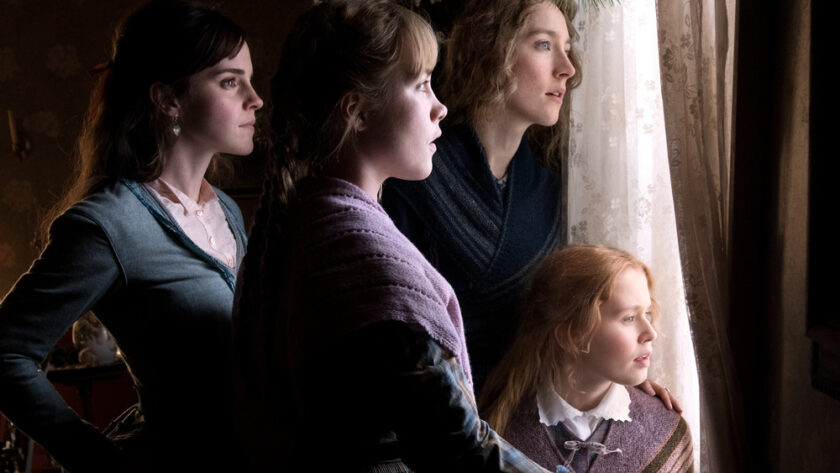Isobel Rose Binnie looks at the role reversal of Jo and Amy March in her review of Greta Gerwig’s Little Women.
Louisa May Alcott’s Little Women was the first book which made me cry. When I learned that Greta Gerwig was set to adapt it, I didn’t feel anxious in the least. Should I have been? Gerwig’s approach turned out to be different from what I expected, but may be my favourite adaptation yet.
Gerwig’s portfolio has a history of steering narratives towards her own experience. Teenage angst and a pessimistic attitude towards the reality of becoming an adult are only a few of the common threads between this movie and her last film Lady Bird (2017). All of this led me to expect the most dynamic and outspoken Jo yet, especially when I heard that Saoirse Ronan was to play the iconic role. Her performances in previous films made the lack of intensity in her portrayal of Jo surprising to me; her version of the beloved character felt outspoken but too mature and tired, a significant disparity compared to how she appears in the book.

Florence Pugh’s performance, however, was full of an innocent passion that ended up carrying Jo’s dead weight. Amy March, the endearing but vain people-pleaser, desires to be part of society yet remains charismatic rather than overbearing. Gerwig’s reorganization of the storyline kept the main plot lines and scenes, but reordered into two timelines, one focused on their childhood and the other on adulthood. The emphasis on Amy was clear from the start, and her and Laurie’s (Timothée Chalamet) marriage at the end was very predictable, nullifying the plot twist the story is most famous for. The other sisters’ portrayal seemed rather disregarded in comparison.
In the novel, Amy is not as likeable as Jo. Amy starts by burning Jo’s script for her novel, proceeds to take the Europe trip from under Jo’s nose, and then, in the second most heartbreaking moment aside from Beth’s death, Amy marries Laurie. Through Gerwig’s style of building up her characters and setting tone —setting up backstory using scenes without major contribution to the outcome of the characters— we understand early on Laurie’s fascination with the sisters and the warmth of the March family. The movie’s trailer betrays the amount of focus the movie has on Jo and Laurie’s relationship, resulting in a slightly dissapointing watch.

For me, Little Women was always Jo’s story; she was the girl I wanted to be, – strong-willed, independent, boyish and rebellious – defiant of patriarchy and gender roles. Jo is perhaps a reflection of Louise May Alcott herself, who once wrote that she had “a man’s soul put by some freak of nature into a woman’s body.” Gerwig’s focus on Amy brings attention to a different side of the narrative. People tend to associate boyish and defiant women as characters with strength, which is itself the reflection of a prejudice against femininity. People dislike strong characters that are traditionally effeminate or that work within the parameters that society placed for her.
Amy clashes with Jo in every way. Jo is opposed to the concept of marriage but Amy chooses to be a realist and take as much advantage as possible of the system (“I always knew I would marry rich, why should I be ashamed of it?”). While Jo persists as a writer, Amy is pragmatic and chooses marriage over art. The elder sister is an idealist and throughout the film you can feel her trying to cling to what remains of her childhood: her relationship with Laurie, her closeness to her sister Meg (Emma Watson), her instistance on independence. Amy, however, has been planning her future since she was a young girl. Their diffence to one another is also reflected in how they interact with Laurie; he is playful and free-spirited with Jo, while grounded and restrained alongside Amy.

It is during the scenes in Paris where we come to understand Amy’s role in Little Women: she is a martyr, sacrificing herself by entering into the dependence of marriage. Laurie, on the other side, is portrayed as too spoiled to be able to pick himself up after Jo’s rejection and too superficial to take advantage of his wealth, contrasting with the altruistic and passionate Laurie from childhood. Gerwig’s glorifies and romanticizes their relationship by showing Amy force Laurie to pick himself up, culminating in the central romantic storyline of the film.
While Amy and Laurie’s arc is touching, the main reason I fell for this adaptation were the last scenes of Jo agreeing to marry Frederich Bhaer. Louisa May Alcott had wanted her protagonist to stay single, but her publishers wanted Jo married before they would consent to publish her book. This tradeoff is incorporated in the film, where Jo has to compromise the integrity of her novel and marry the main character in order to get published.
Aside from being presented as a purely economic proposition, marriage is also associated with prison and fatality in the film. Gerwig altered the order of the narrative as to associate the timing of Beth’s death with that of Meg’s wedding. Marmee (Laura Dern), the only already married character, is “angry every day of her life.” All the sisters’ personalities fade after marrying. Everyone always hated the ending of the novel Little Women; seven year old me wanted to see Jo with Laurie, but I now stand by their incompatibility.

This story is all about the warmth and nostalgia of childhood. Jo and Laurie’s breakup wasn’t just about love, but rather represented the end of an era, and Jo’s inability to grasp the dull concept of adult life. When Jo decides to marry Bhaer, Gerwig leaves room for interpretation. Jo’s conversation with the publicist is voiced over the couple’s dramatic reunion at a train station, which effectively stops Friedrich from leaving the country as planned. However, Jo tells her publisher that in her version of the story (perhaps the real version), the character does not marry Friedrich or Laurie.
In this moment, Jo sells one dream to be able to access another. The March family – whose opinion Jo trusts above all else – recognize Jo’s love for Bhaer and encourage her to marry him. If Gerwig’s character must marry – the same dilemma Mary Louise Alcott faced over 150 years ago – she must do it well. Through the construction of Gerwig’s meta-narrative, the scene at the train station feels like the death of Jo March, an ending I never knew I needed.
Little Women is still playing in select cinemas. Watch the trailer here:




